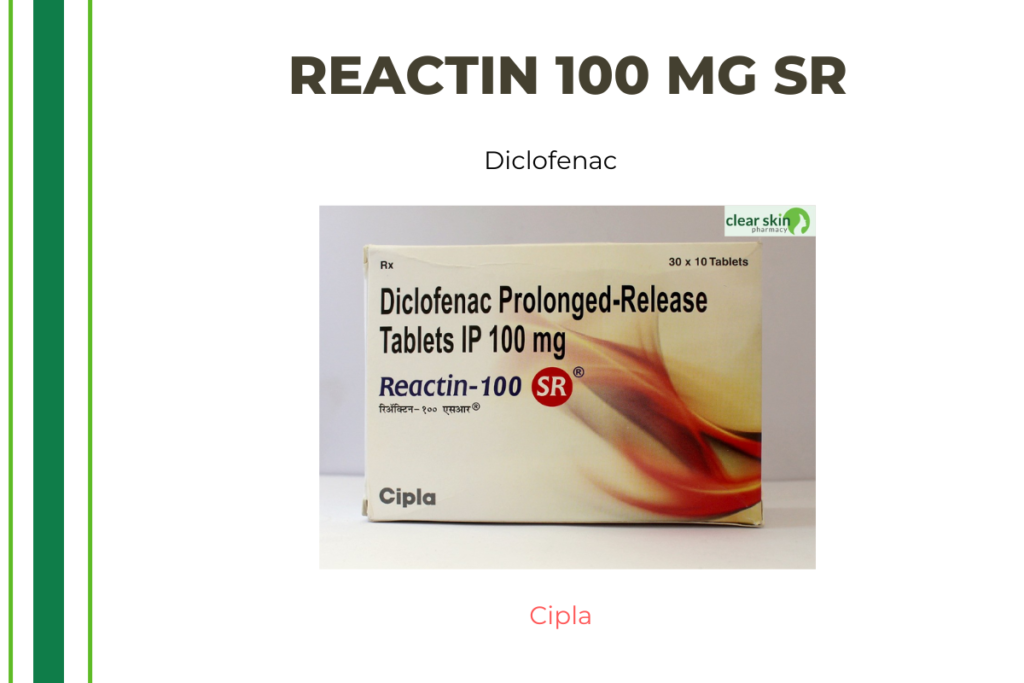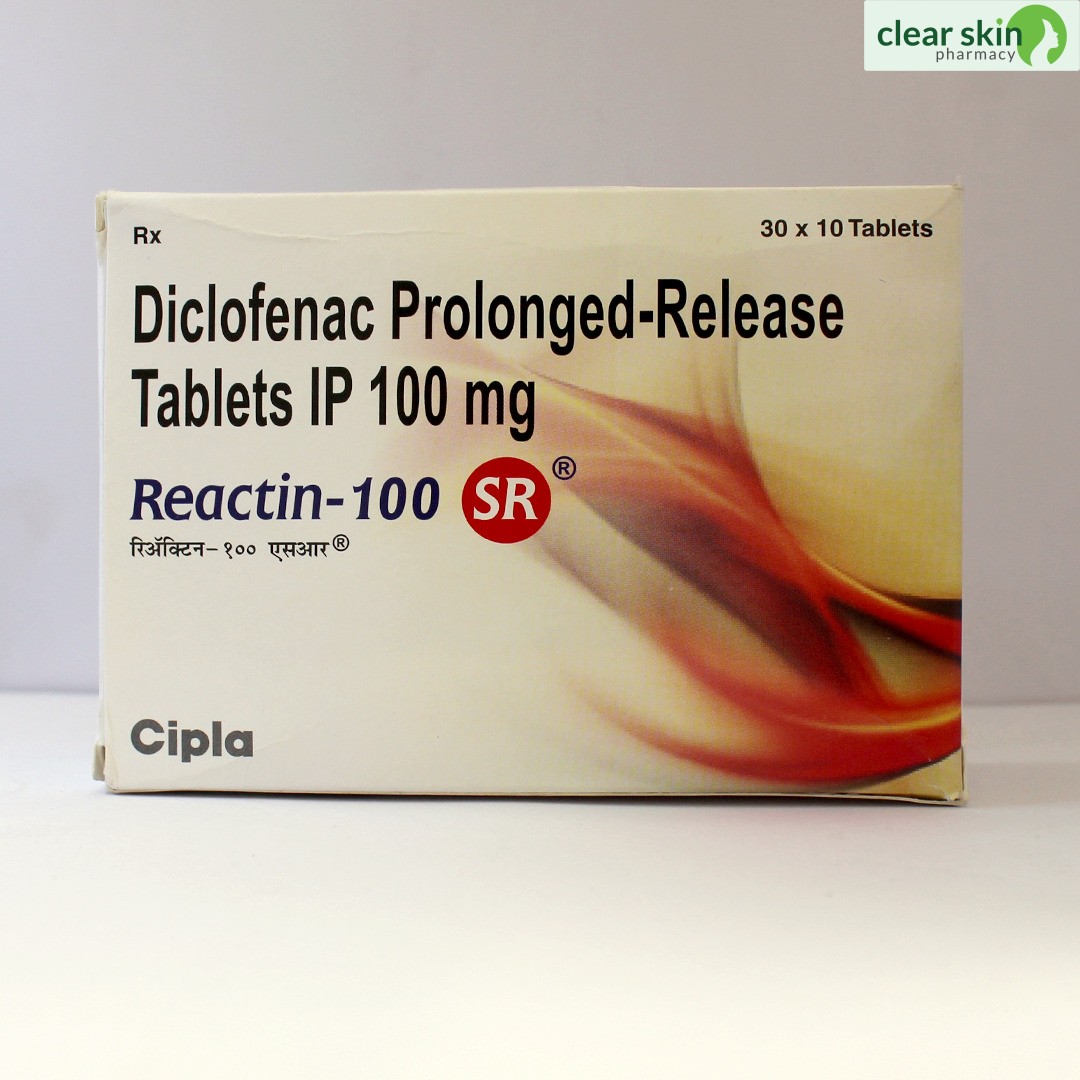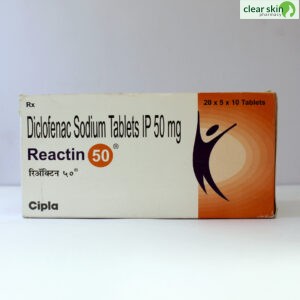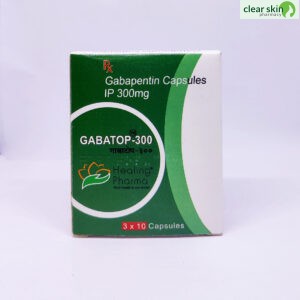Reactin 100 MG SR (Slow Release)
Reactin 100 MG SR (Slow Release) is a non-sedative, non-steroidal anti-inflammatory pain medication (NSAID). Primarily employed to alleviate pain and inflammation. When tissue is injured, an unpleasant physical sensation and mental experience known as pain results. It permits the body to respond and prevent additional tissue damage. Acute (short-term) and chronic (long-term) pain are both possible (chronic). Pain perception can range from tolerable to terrible depending on the individual.
Reactin 100 MG SR (Slow Release) is utilized to treat aches and pains as well as musculoskeletal and joint pain. Among other conditions, it can alleviate acute migraine headaches, muscle pain, dental pain, rheumatoid arthritis, ankylosing spondylitis, osteoarthritis, and uncomfortable menstruation. Reactin 100 MG SR (Slow Release) inhibits the chemical action of cyclo-oxygenase (COX), an enzyme that produces prostaglandins (pain and inflammation mediators) that are responsible for the experience of pain and inflammation at the sites of injury and damage.
Take 100 mg of Reactin SR (Slow Release) precisely as prescribed. Reactin 100 MG SR (Slow Release) is regarded as generally safe. Stomach pain, heartburn, nausea, vomiting, diarrhea, indigestion, appetite loss, headache, and dizziness are all possible adverse effects. The majority of negative effects associated with Reactin 100 MG SR (Slow Release) do not require medical attention and resolve with time. However, if the bad effects persist, visit a physician.
Consuming alcohol while treatment with Reactin 100 MG SR (Slow Release) increases the risk of liver damage. Reactin 100 mg SR (Slow Release) is contraindicated in people with stomach ulcers, gastric hemorrhage, severe heart failure, high blood pressure, liver or kidney disease. Aside from these exceptions, it should be avoided during the third trimester of pregnancy unless your doctor recommends it.
Pain relief is one of the numerous advantages of Reactin 100 MG SR (Slow Release).

Medicinal Advantages
Reactin 100 mg SR (Slow Release) alleviates moderate to severe arthritic pain, edema, and stiffness. Reactin 100 MG SR (Slow Release) aids in the alleviation of these general symptoms, allowing you to manage and carry out daily activities. As suppositories and topical gel, Reactin 100 MG SR (Slow Release) is also available to protect the stomach against gastric discomfort. Additionally, it can alleviate acute migraine headaches, muscle pain, dental pain, rheumatoid arthritis, ankylosing spondylitis, osteoarthritis, and uncomfortable menstruation.
To prevent stomach upset or irritation, take the pill with water during or after a meal. It should not be chewed, divided, or broken. Wash your hands and apply the medication to the sore or swollen area. Insert the pointed end of the suppository into your back tube with care (anus). It should travel at least 1 inch into the anus. Lie down for at least 15 minutes after inserting the suppository for optimal results.
Place in a cool, dry area out of direct sunlight.
Reactin 100 MG SR (Slow Release) Side Effects
stomachache
Heartburn
nauseous (feeling sick)
I’m throwing up (being sick)
Diarrhea
Indigestion
Appetite loss.
Headache
Dizziness
Drug Recommendations
Consuming alcohol while treatment with Reactin 100 MG SR (Slow Release) increases the risk of liver damage. Reactin 100 mg SR (Slow Release) is contraindicated in people with stomach ulcers, gastric hemorrhage, severe heart failure, high blood pressure, liver or kidney disease. Aside from these exceptions, it should be avoided during the third trimester of pregnancy unless your doctor recommends it. Stop taking Reactin 100 MG SR (Slow Release) immediately if you have a severe allergy to opioids or asthma, rhinitis, angioedema, or skin rashes.
Interactions Between Drugs
Interactions among medications: Pain relievers (nimesulide, oxyphenbutazone, metamizole), anti-blood clotting medications (warfarin), blood pressure-lowering therapies (hydrochlorothiazide), and mania treatments (lithium), among others, should not be taken with Diclofenac since they may interact with it. Inform your doctor if you are using any of these medications.
No food-drug interactions have been identified.
Drug-Disease Interaction: Patients with a peptic ulcer, gastrointestinal bleeding, severe heart failure, diarrhea, or high blood pressure should avoid Diclofenac since it may induce life-threatening consequences.
Safety Suggestions
ALCOHOL
Alcohol should be avoided while using Diclofenac to prevent unpleasant side effects such as gastrointestinal hemorrhage.
PREGNANCY
Taking Diclofenac during the first six months of pregnancy is not suggested. If your doctor considers that the benefits outweigh the risks, he or she may prescribe Diclofenac for you throughout the first six months of your pregnancy. However, during the last three months of pregnancy, Diclofenac should not be taken because it may harm the fetus and delay labor.
BREAST FEEDING
While Diclofenac can enter breast milk, there is insufficient evidence to support its safety in nursing mothers. Therefore, it is advised that you only take it if your physician has prescribed it.
DRIVING
Diclofenac may provoke vertigo and drowsiness in certain individuals. Stop using Diclofenac Tablet 10’s immediately if you experience any of the above symptoms.
LIVER
Consult your physician prior to using this medication if you have a history of or symptoms of liver-related diseases.
KIDNEY
Consult your physician prior to using this drug if you have a history of kidney disease.
No habit formation
Advice on Diet and Lifestyle
Increase your intake of supplements including glucosamine, chondroitin sulfate, vitamin D, and calcium. In addition, turmeric and fish oils can reduce tissue inflammation.
If you have arthritis, you should avoid vigorous exercise because it might exacerbate joint discomfort. Stretching and low-impact cardiovascular exercises such as treadmill walking, cycling, and swimming should be performed instead. Additionally, lifting small weights can assist increase muscle strength.
If you suffer from arthritis or joint discomfort, eat seafood such as salmon, trout, tuna, and sardines. These fish are rich in omega-3 fatty acids, which reduce the amount of inflammatory molecules called cytokines.
Especially if you suffer from discomfort or inflammation, your sitting position is vital. As little as possible and for as short a duration as possible, sit (10-15 min). To alleviate pain, use a towel rolled up behind your curve as a back support. Keep the angle between your knees and hips straight. Additionally, a footrest can be used if necessary.
Recommendations
Diclofenac has a history of causing gastrointestinal distress. To prevent gastrointestinal adverse effects, it is advised to take Diclofenac with food. If you have a peptic ulcer, you should avoid taking Diclofenac unless your doctor recommends it.
When administered in high amounts, diclofenac may cause liver damage. Because it exacerbates liver damage, alcohol should not be ingested concurrently with hepatotoxic drugs.
Diclofenac is generally safe, but those with kidney problems should avoid it because it can decrease renal function.
If you experience diarrhea or vomiting while taking Diclofenac Tablet 10’s, discuss with your doctor whether you should continue taking it, as it may cause dehydration and damage to the kidneys.
Although Diclofenac provides symptomatic relief for ailments such as arthritis and may lessen the inflammation caused by these conditions, it is strongly recommended that you engage in as much physical activity as your condition permits for the best results. The cornerstone of arthritic disease treatment is a healthy lifestyle coupled with a protein-rich diet.
Other details : This item is non-refundable.
Glossary of Diseases and Conditions
When tissue is injured, an unpleasant physical and emotional experience known as pain ensues. It permits the body to respond and prevent additional tissue damage. Acute (short-term) and chronic (long-term) pain are both possible (chronic). Pain perception can range from tolerable to terrible depending on the individual.
Rheumatoid arthritis is a joint-affecting, chronic inflammatory illness (hands and feet). Our immune system destroys our own tissue in this chronic illness (including joints).
Ankylosing spondylitis (AS) is a rare form of arthritis that causes terrible pain and stiffness by affecting the spine and larger joints.
FAQs
In general, diclofenac is regarded as safe. Some patients may experience nausea, vomiting, stomach discomfort, diarrhoea, and other uncommon unpleasant effects.
If diclofenac is provided only for short-term pain relief, the medication can be withdrawn. It is suggested that you follow your doctor’s directions for long-term use.
Some patients taking diclofenac may experience vertigo. They may experience symptoms including vertigo, lightheadedness, or fainting.
According to your medical situation, you should take diclofenac for the prescribed duration.
Diclofenac can elicit bladder symptoms such as uncomfortable or frequent urination and blood in the urine. Stop taking this medication immediately and contact your doctor if you have these symptoms.
Diclofenac is not suggested for stomach pain. See a doctor if you are having stomach pain. Stomach pain may indicate an ulcer, acid reflux, or a gastric hemorrhage.







Be the first to review “REACTIN 100 mg SR 10 tablets”